|
De Albanese schrijver Fatos Kongoli werd geboren op 12 januari 1944 in Elbasan. Zie ook mijn blog van 12 januari 2009 en ook mijn blog van 12 januari 2010.
xml:namespace prefix = o ns = "urn:schemas-microsoft-com:office:office" />
Uit: Ein europäischer Traum (Vertaald door Joachim Roehm)
Als ich den letzten Jahren seines Lebens einmal von ihm wissen wollte, warum er Kommunist geworden war, drückte er sich nicht um eine Antwort: Während der Jahre in Italien sei dies die beste Lösung gewesen. Er habe vor der Alternative gestanden, sich entweder für den Kommunismus eines Antonio Gramsci zu entscheiden oder für den Faschismus des Duce ... Es liegt mir fern, meinem Vater etwas vorzuwerfen, doch außer dem Faschismus des Duce und dem Kommunismus eines Antonio Gramsci wird es in Verdis Vaterland auch noch andere Alternativen gegeben haben. Die letzten Jahre seines Lebens, das tragisch endete, denn er wurde von seiner eigenen Partei geächtet und weggeworfen wie eine ausgequetschte Zitrone, verbrachte er am Klavier, Fugen von Bach spielend, bis er dann starb, verlassen selbst noch von seinen engsten Freunden. Ich, der ich endlich die Mathematik aufgegeben und mich der Literatur zugewandt hatte, begriff damals, dass ich womöglich
den gefährlichsten Fehler meines Lebens begangen hatte. Die Sprache Molières eröffnete mir die Möglichkeit, Kontakt mit den großen Autoren des 20. Jahrhunderts aufzunehmen, und ich begriff einigermaßen, was wirklich Literatur ist. In einem Land wie Albanien, wo auch noch dem unschuldigsten Dissidenten ohne lange zu fackeln der Kopf abgerissen wurde, war es verflucht schwierig, sich mit wirklicher Literatur abzugeben. Aber dieses verdrießliche Kapitel ist allgemein bekannt, und nach dem Fall der Berliner Mauer hat dies alles nichts mehr zu bedeuten. Auerdem
hätte niemand wirklich Lust, mir in den finsteren Tunnel dieser langen Jahrzehnte zu folgen, in denen meine Zähne allmählich verrotteten und zum Teil viel zu früh ausfielen, bis ich mir schließlich ziehen und durch eine Prothese ersetzen ließ, was noch übrig war, sodass ich nun nach Belieben lachen kann, wenn mir zum Weinen ist, ohne befürchten zu müssen, dass ich so schrecklich hässlich aussehe wie in der Zeit vor meiner Prothese.
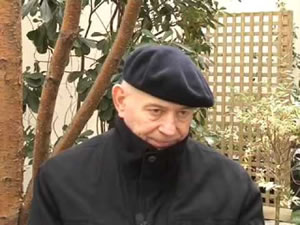
Fatos Kongoli (Elbasan, 12 januari 1944)
De Britse schrijver William Nicholson werd geboren op 12 januari 1948 in Tunbridge Wells, Kent. Zie ook mijn blog van 12 januari 2009 en ook mijn blog van 12 januari 2010.
Uit: The Trial of True Love
Here where two rivers meet by an island, in the early morning, shortly after dawn, there is a mist along the valleys. The sun rises over the railway bridge, white as a moon, and everything is still. I stand before Taw pool, watching the water eddy round the island, my breath cloudy and my thoughts far away. I do not anticipate. And yet there is a moment before the moment that is both a preparation and a culmination. What is about to happen to me is long longed-for, familiar, out of reach, needed, despaired of, completely imagined, but never known: so first, and memorably, comes the intimation that it is about to happen. The light falling from an opening door onto a winter's street. The silence before a phone begins to ring. Anticipation, in the razor-cut of time before it bursts into fulfilment.
The Barnstaple train, headlamp furry in the mist, booms suddenly over the bridge. Rooks rattle out of invisible trees, cawing up into the sky. The premonitory sounds disperse into the slow tumble of the rivers, into my own quiet breaths. The smell of soaked grass and the sharp white air that makes me shiver and the silence after the train.
And then I see her.
This is a story about falling in love. The time is 1977, a generation ago. I am twenty-nine years old, and waiting for my real life to begin. I am engaged in this waiting process in the very small second bedroom of a very small flat in Cross Street in north London, owned by my friend Anna.
She comes back earlier than usual and pours herself a glass of wine, which is not like her, not at five in the afternoon, and says we must talk. So I have a glass of wine too, and we talk.
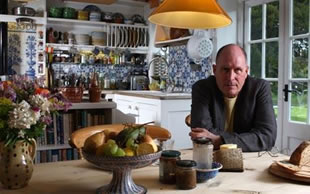
William Nicholson (Tunbridge Wells, 12 januari 1948)
De Duitse schrijver, schilder en componist Florian Havemann werd geboren op 12 januari 1952 in Oost-Berlijn. Zie ook mijn blog van 12 januari 2009 en ook mijn blog van 12 januari 2010.
Uit: Havemann
Havemann, das ist: ein König ohne Volk bleiben zu wollen, anstatt sich mit dem undankbaren, uneinsichtigen Volk da draußen abmühen, abgeben zu müssen. Und das können dann auch zum Beispiel Kritiker sein. Havemann, das ist: sich irgendwo festsetzen, eine häusliche Existenz führen. Grabow, Borgsdorf und Grünheide bei Berlin, mein Neukölln.
Havemann beginnt mit einem Saathändler, und der Saathändler, das ist Mittelstand, Mittelschicht, und Havemann ist das immer geblieben: Mittelstand, Mittelschicht nur was das bedeutet, das hat sich immer wieder geändert.
Nein, Havemann beginnt nicht mit diesem Saathändler in Grabow, Havemann beginnt so wenig mit diesem Saathändler in Grabow, daß ich noch nicht mal weiß, wie dieser Havemann mit Vornamen hieß. Der Saathändler Havemann in Grabow, das ist die Vorgeschichte von Havemann, das, wo Havemann herkommt, das, woraus dann Havemann wurde, mit meinem Großvater Hans Havemann wurde, dem Sohn des Saathändlers Havemann in Grabow. Und wenn noch etwas bleibt von diesem Havemann in Grabow, bis zum heutigen Tag und in mir Havemann bleibt, dann der Atheismus, sein Atheismus, denn das einzige, was mir von diesem Saathändler Havemann übermittelt wurde, ist sein für seine Zeit so ungewöhnlicher Atheismus. Sein für eine Kleinstadt so ungewöhnlicher, so auff älliger Atheismus. Der bekennende Atheist Havemann, so die Legende, soll nur ein einziges Mal eine Kirche betreten haben, die Kirche in Grabow Anlaß: die Konfi rmation seines Sohnes.
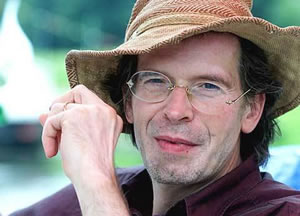
Florian Havemann (Oost-Berlijn,12 januari 1952)
De Amerikaanse schrijver Jack London (eig. John Griffith Chaney) werd geboren op 12 januari 1876 in San Francisco, Californië. Zie ook mijn blog van 12 januari 2009 en ook mijn blog van 12 januari 2010.
Uit: John Barleycorn
It all came to me one election day. It was on a warm California afternoon, and I had ridden down into the Valley of the Moon from the ranch to the little village to vote yes and no to a host of proposed amendments to the Constitution of the State of California. Because of the warmth of the day I had had several drinks before casting my ballot, and divers drinks after casting it. Then I had ridden up through the vine-clad hills and rolling pastures of the ranch and arrived at the farmhouse in time for another drink and supper.
How did you vote on the suffrage amendment? Charmian asked.
I voted for it.
She uttered an exclamation of surprise. For be it known, in my younger days, despite my ardent democracy, I had been opposed to woman suffrage. In my later and more tolerant years I had been unenthusiastic in my acceptance of it as an inevitable social phenomenon.
Now just why did you vote for it? Charmian asked.
I answered. I answered at length. I answered indignantly. The more I answered, the more indignant I became. (No; I was not drunk. The horse I had ridden was well-named The Outlaw. I d like to see any drunken man ride her.)
And yethow shall I say?I was lighted up, I was feeling good, I was pleasantly jingled.
When the women get the ballot, they will vote for prohibition, I said. It is the wives, and sisters, and mothers, and they only, who will drive the nails into the coffin of John Barleycorn
But I thought you were a friend to John Barleycorn, Charmian interpolated.
I am. I was. I am not. I never am. I am never less his friend than when he is with me and when I seem most his friend. He is the king of liars. He is the frankest truth-sayer. He is the august companion with whom one walks with the gods. He is also in league with the Noseless One. His way leads to truth naked, and to death. He gives clear vision, and muddy dreams. He is the enemy of life, and the teacher of wisdom beyond lifes vision. He is a red-handed killer, and he slays youth.
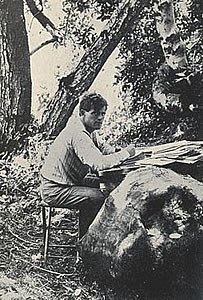
Jack London (12 januari 1876 - 22 november 1916)
In 1905
De Hongaarse schrijver Ferenc Molnár werd op 12 januari 1878 in een burgerlijk-joods gezin van Duitse afkomst geboren. Zie ook mijn blog van 12 januari 2009 en ook mijn blog van 12 januari 2010.
Uit: The Living Death
Here is a very serious reason, my dear sisters, why at last, after an absence of twenty years in America, I am confiding to you this strange secret in the life of our beloved and lamented father, and
of the old house where we were children together. The truth is, if I read rightly the countenances of my physicians as they whisper to each other by the window of the chamber in which I am lying, that
only a few days of this life remain to me.
It is not right that this secret should die with me, my dear sisters. Though it will seem terrible to you, as it has to me, it will enable you to better understand our blessed father, help you to account for what must have seemed to you to be strange inconsistencies in his character. That this secret was revealed to me was due to my indolence and childish curiosity.
For the first, and the last, time in my life I listened at a keyhole. With shame and a hotly chiding conscience I yielded to that insatiable curiosity--and when you have read these lines you will understand why I do not regret that inexcusable, furtive act.
I was only a lad when we went to live in that odd little house. You remember it stood in the outskirts of Rakos, near the new cemetery. It stood on a deep lot, and was roughly boarded on the side which looked on the highway. You remember that on the first floor, next the street, were the room of our father, the dining room, and the children's room. In the rear of the house was the sculpture studio. There we had the large white hall with big windows, where white-clothed laborers worked. They mixed the plaster, made forms, chiseled, scratched, and sawed. Here in this large hall had our father worked for thirty years.
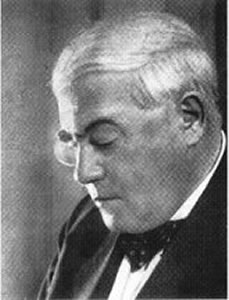
Ferenc Molnár (12 januari 1878 1 april 1952)
De Franse schrijver Charles Perrault werd geboren op 12 januari 1628 in Parijs. Zie ook mijn blog van 12 januari 2007 en ook mijn blog van 12 januari 2009 en ook mijn blog van 12 januari 2010.
Uit: Les Souhaits Ridicules (De dwaze wensen)
Si vous étiez moins raisonnable,
Je me garderais bien de venir vous conter
La folle et peu galante fable
Que je m'en vais vous débiter.
Une aune de Boudin en fournit la matière.
Une aune de Boudin, ma chère !
Quelle pitié ! c'est une horreur
S'écriait une Précieuse,
Qui toujours tendre et sérieuse
Ne veut ouïr parler que d'affaires de coeur.
Mais vous qui mieux qu'âme qui vive
Savez charmer en racontant,
Et dont l'expression est toujours si naïve,
Que l'on croit voir ce qu'on entend ;
Qui savez que c'est la manière
Dont quelque chose est inventé,
Qui beaucoup plus que la matière
De tout Récit fait la beauté,
Vous aimerez ma fable et sa moralité ;
J'en ai, j'ose le dire, une assurance entière.
Il était une fois un pauvre Bûcheron
Qui las de sa pénible vie,
Avait, disait-il, grande envie
De s'aller reposer aux bords de l'Achéron :
Représentant, dans sa douleur profonde,
Que depuis qu'il était au monde,
Le Ciel cruel n'avait jamais
Voulu remplir un seul de ses souhaits.
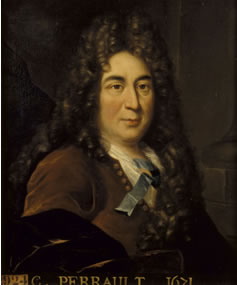
Charles Perrault (12 januari 1628 16 mei 1703)
Anoniem portret in het
|



